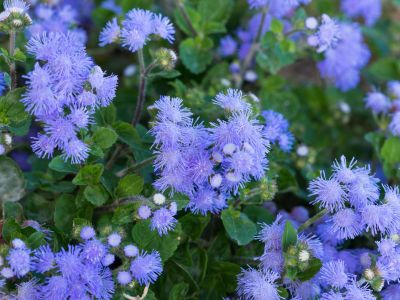Growing Ageratum from Seed
Commonly called floss flower, ageratum has fuzzy, button-like blooms that attract pollinators to the yard. The quarter-inch (6 mm.) fringed flowers grow in dense, one-inch (2.5 cm.) clusters from midsummer to fall. Green leaves are oval to heart-shaped. Besides blue, ageratum cultivars include shades of white, pink, and bicolor in dwarf plants as well as tall plants ideal for cutting. Choose a sunny site to grow ageratum or if summers are really hot, part shade is preferred. Plant ageratum in borders (front or back depending on cultivar height), containers, xeriscape gardens, cutting gardens, and use for dried flowers. Pair with yellow marigolds for a bold look or go soft with pink begonias. While these plants are commonly purchased as transplants in most places, growing ageratum from seed is just as easy and fun to do.
How to Plant Ageratum Seeds
Sow seeds in a moist potting mix six to eight weeks before the last frost date. Do not cover seeds, as light aids ageratum seed germination. Water from the bottom or use a mister to prevent splashing soil that would cover seeds. Keep soil moist but not wet. Seedlings should emerge in seven to ten days at 75 to 80 degrees F. (24-27 C.). Keep plants warm with a warming mat or place them in a bright location out of the direct sun. Transfer to cell packs or pots when tall enough to handle. Slowly acclimate (harden off) plants by moving them outside to a shady area and then back inside. Leave them outside for increasing lengths of time. Then, after all, the danger of frost has passed, plant outside in fertile, well-drained soil in a sunny or part-shaded area. Water regularly but ageratum will tolerate dry spells.
Tips for Starting Ageratum Seeds
Buy seeds from a reputable source. The popular ‘Hawaii’ series blooms in blue, white, or pink. ‘Red Top’ grows 2 feet tall (61 cm.) with magenta flower heads. ‘Blue Danube’ is a reliable, compact purple blue hybrid. Bicolors include ‘Southern Cross,’ and ‘Pinky Improved.’ Keep seeds in a cool place such as the refrigerator till ready to plant. Prior to planting outside, mix organic fertilizer into the garden bed or container. Direct seeding outside is not recommended. Ageratum will not tolerate frost so cover on cold nights to extend the season. Keep ageratum tidy and increase flowering by pinching off spent blooms. Ageratum freely self-seeds so it is not normally necessary to replant each year. Ageratum typically is not bothered by pests and diseases, but watch for spider mites, aphids, and whiteflies. Diseases such as powdery mildew, root rot, parasitic nematodes, and oedema have been reported.
